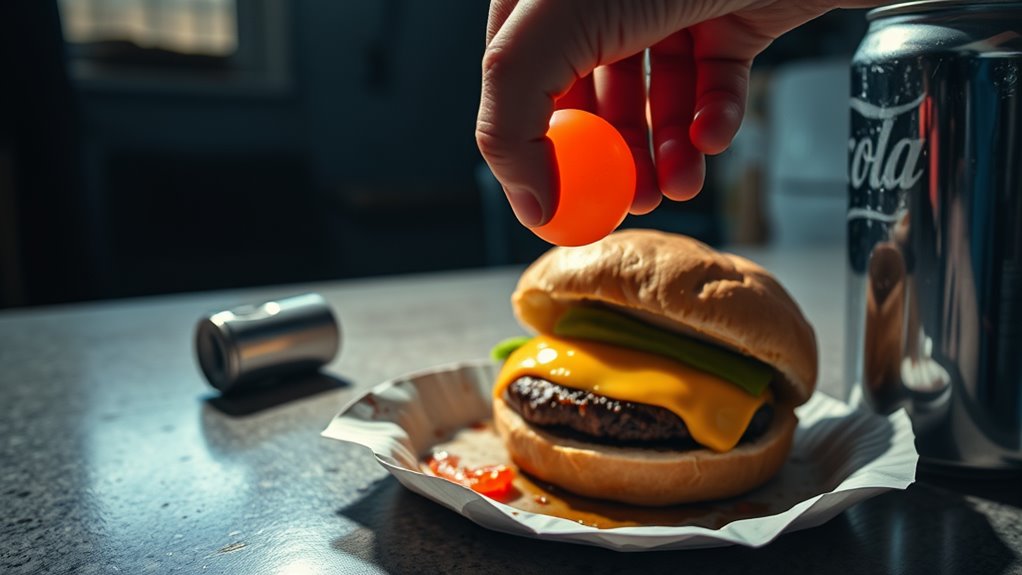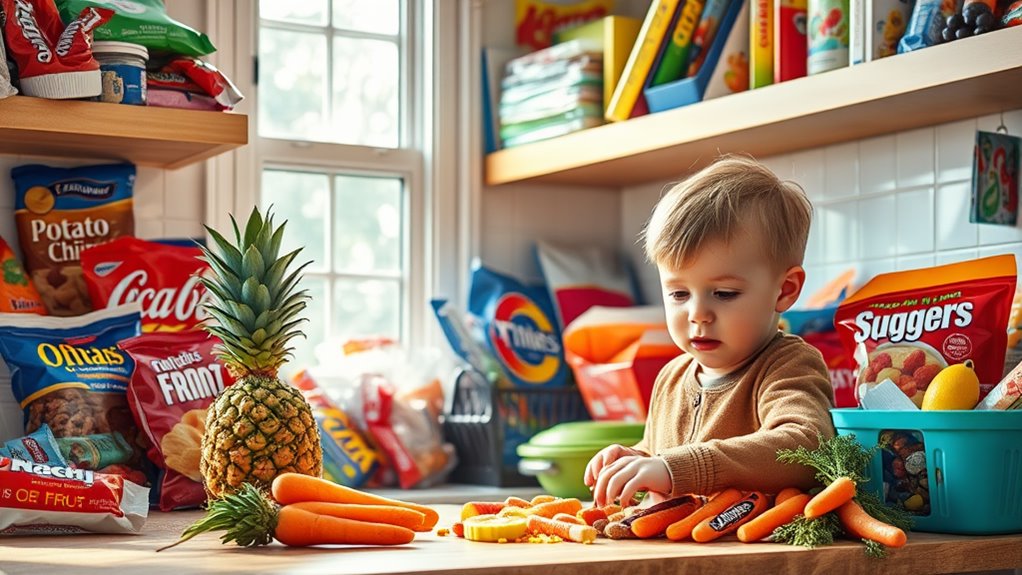The Scary Truth About Junk Food and Your Kids!
Junk food isn’t just a guilty pleasure; it can seriously harm your kids. Regular consumption leads to obesity, diabetes, and weakened immune systems. It also lacks essential nutrients, which can stunt their growth and impair concentration. Mentally, a diet heavy in junk food is linked to mood swings, anxiety, and even depression. Plus, it can trigger hyperactivity and irritability. To combat these issues, stock up on healthy snacks and involve your kids in meal prep. You’ll find that fostering good eating habits pays off in many ways. There’s much more to discover about keeping your children healthy and happy.
The Health Risks of Junk Food
Junk food poses significant health risks, especially for kids. When you allow your child to indulge in sugary snacks and fast food regularly, you’re setting up a path that could lead to obesity. Those extra calories don’t just add weight; they can contribute to long-term health issues like diabetes and heart disease.
Additionally, junk food is often low in essential nutrients. Your child might fill up on chips and candy but miss out on important vitamins and minerals needed for growth and development. This nutritional gap can lead to fatigue, weakened immune systems, and poor concentration in school.
Another risk is the impact on mental health. Studies suggest that a diet high in processed foods can be linked to anxiety and depression, which can affect your child’s emotional well-being and social interactions.
You might think that treating your child to junk food occasionally is harmless, but it’s crucial to be mindful of these risks. By prioritizing healthier options, you’re not just promoting better physical health; you’re also supporting their mental and emotional growth in the long run. Choose wisely, and you’ll set a strong foundation for your child’s future.
Impact on Physical Development
The impact of poor dietary choices on a child’s physical development can be profound. When kids regularly consume junk food, they miss out on essential nutrients needed for growth. This can lead to stunted growth, weakened bones, and overall poor health.
Consider the following comparison of nutritional content:
| Food Type | Nutritional Value | Impact on Development |
|---|---|---|
| Fruits & Veggies | High in vitamins, minerals | Supports growth and immunity |
| Junk Food | High in sugar, low in fiber | Leads to obesity and nutrient deficiencies |
| Whole Grains | Rich in fiber and energy | Promotes healthy digestion and energy levels |
When your child chooses junk food over healthier options, they’re not just opting for a tasty treat; they’re making a choice that can hinder their physical growth. Higher sugar intake can also lead to energy crashes, making it harder for them to stay active. You want your child to thrive, and that starts with providing them the right fuel. By prioritizing nutritious foods, you can help ensure they develop physically in a healthy way.
Effects on Mental Health
Regularly consuming junk food not only affects a child’s physical growth but also has significant implications for their mental health. When kids fill up on sugary snacks and processed foods, they may experience mood swings, anxiety, and even depression. These foods often lack essential nutrients that support brain function, leaving your child feeling sluggish and irritable.
You might notice that after a day filled with junk food, your child seems less focused and more easily frustrated. This can impact their performance in school and their interactions with peers. Additionally, the high sugar content in junk food can lead to energy spikes followed by crashes, further exacerbating mood fluctuations.
Moreover, a diet rich in unhealthy fats and sugars can contribute to inflammation in the brain, which has been linked to various mental health issues. It’s essential to encourage healthier eating habits, as good nutrition can promote better emotional well-being. By providing balanced meals and snacks, you’re not just supporting their physical health but also fostering a more stable and positive mental state. So, think twice before letting those junk food cravings take over!
Behavioral Changes Linked to Diet
When children consume a diet high in processed foods and sugars, you might notice noticeable shifts in their behavior. These dietary choices can lead to increased hyperactivity, irritability, and emotional swings. You may find that your child struggles to focus on tasks or becomes easily frustrated over minor setbacks. This change isn’t just a coincidence; studies show a direct link between high sugar intake and behavioral issues.
Moreover, the consumption of junk food can impact your child’s sleep patterns. Poor sleep can lead to even more pronounced mood swings and decreased attention spans. You might also observe social withdrawal or a lack of interest in activities they once enjoyed. Unhealthy eating habits can foster feelings of anxiety and depression, which can further compound behavioral issues.
It’s essential to pay attention to these changes and consider how their diet could be influencing their mood and actions. Encouraging a balanced diet rich in nutrients can help stabilize their behavior and improve their overall well-being. By being aware of these connections, you can better support your child’s emotional and behavioral health.
Strategies for Healthier Choices
Making healthier food choices for your kids doesn’t have to be overwhelming or feel like a chore. Start by stocking your pantry and fridge with nutritious options. Fill it with fruits, veggies, whole grains, and lean proteins. When your kids see these items, they’ll be more likely to choose them over junk food.
Next, involve your kids in meal planning and preparation. Let them pick out recipes or help you cook. This not only teaches them valuable skills but also gives them a sense of ownership over their meals. You can also create a snack drawer filled with healthy choices like yogurt, nuts, or whole grain crackers.
Set a good example by making your own healthy choices. Kids are more likely to mimic your habits, so show them how enjoyable nutritious foods can be. Additionally, make mealtime a pleasant experience free from distractions. This encourages mindful eating and helps them appreciate their meals.
Finally, don’t forget to be patient. It may take time for your kids to adjust to healthier options. Celebrate small victories and encourage them to try new foods without pressure. With these strategies, you can create a healthier environment for your family.
Encouraging Kids to Eat Well
Creating a positive atmosphere around food can significantly influence your kids’ eating habits. Start by involving them in meal planning and preparation. Let your kids pick a healthy recipe, and take them grocery shopping to choose fresh ingredients together. This helps them feel invested in their meals and more likely to try new foods.
Make mealtime enjoyable by sitting down as a family. Encourage conversations about the day and share stories, which can make eating a fun experience. Avoid using food as a reward or punishment, as this can create negative associations with healthy eating.
Set a good example by eating nutritious foods yourself. Kids often mimic adult behavior, so if they see you enjoying fruits and vegetables, they’re more likely to do the same. Keep healthy snacks readily available, and limit junk food in your home. When they crave something sweet or salty, they’ll be more inclined to reach for a healthier option.
Finally, be patient and persistent. It may take several attempts before they warm up to new foods. Celebrate small victories, and remember that fostering a love for healthy eating is a gradual process.
Frequently Asked Questions
Is All Junk Food Equally Harmful to Children?
Not all junk food’s equally harmful to children. Some options, like baked chips or fruit snacks, can be healthier than sugary sodas or candy. It’s important to read labels and make informed choices for your kids.
Can Occasional Junk Food Be Part of a Balanced Diet?
Yes, occasional junk food can fit into a balanced diet. It’s all about moderation. You can enjoy treats without guilt, as long as you prioritize nutritious foods most of the time. Balance is key!
How Can I Identify Hidden Sugars in Snacks?
To identify hidden sugars in snacks, check ingredient labels for terms like sucrose, glucose, or fructose. Look for high-fructose corn syrup as well. Remember, the higher up on the list, the more sugar it contains.
What Are Some Healthy Alternatives to Popular Junk Foods?
You can swap chips for air-popped popcorn, soda for sparkling water, and candy for fresh fruit. Try whole grain crackers instead of cookies, or Greek yogurt instead of ice cream for a healthier treat!
Are Fast Food Restaurants Improving Their Children’s Menu Options?
Yes, many fast food restaurants are improving their children’s menu options. You’ll find healthier choices like fruit, yogurt, and grilled items. It’s a positive shift towards better nutrition, making dining out a bit healthier for kids.





